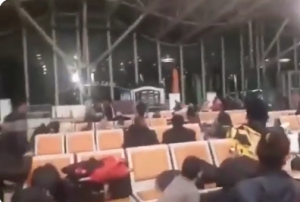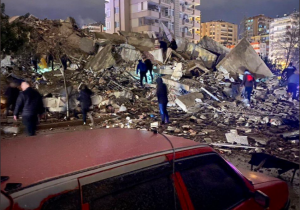Two massive explosions tore through Lebanon’s capital Beirut on Tuesday, killing more than 100 people. Over 4000 people have been injured in the blast, and nearly 300,000 people have been left homeless, authorities have said. Officials claim that the mega-blast was caused due to the ignition of a huge depot of ammonium nitrate at Beirut’s port, but many questions remain.
Here is what we know about the Beirut explosions so far:
The explosion: What happened?
A large explosion occurred in the port area of Beirut at around 6 pm on Tuesday. The explosion resulted in a fire and a series of minor blasts. This was followed by a colossal explosion that sent shockwaves across the Lebanese capital, shaking buildings and shattering glasses. While one Lebanon resident described it as an airstrike, another said that it felt like an earthquake.
According to seismologists, the second explosion was the equivalent of a 3.3-magnitude earthquake. The blast blew out windows at the city’s international airport, which is nearly 10 kilometres away from the port.
Video stills show an intense blazing fireball rising above a line of massive storage silos, then a billowing cloud towering into the sky as a powerful shockwave rips through Lebanon’s biggest city.
Also Read: Beirut blast toll crosses 100
What caused the ‘massive’ blast?
Lebanon’s Prime Minister Hassan Diab said that the explosions were caused due to ammounium nitrate, an agricultural fertiliser. Diab said that 2,750 tonnes of the fertiliser had been stored at a warehouse near the port. The chemical compound blew up, sparking ‘a disaster in every sense of the word’, the Lebanon PM said.
Ammonium nitrate is an odourless crystalline substance that has been the cause of numerous industrial explosions over the decades.
When combined with fuel oils, it creates a potent explosive widely used in the construction industry, and also by insurgent groups such as the Taliban for improvised explosive devices.
Explaining why such large quantities of the compound were being stored on the portside, Lebanon’s General Security chief Abbas Ibrahim said that this ammounium nitrate had been confiscated few years ago. The warehouse where the explosion took place is close to Beirut’s shopping and nightlife districts.
In pics: Utter devastation as toll from Beirut monster
Was the explosion deliberate?
There has been no indication yet from Lebanese government that the explosions were caused deliberately. The officials have said that the circumstances that led to the blasts are ‘unacceptable’ and that an investigation would be launched.

During a press conference on Tuesday, US President Donald Trump raised eyebrows when he claimed that his generals had informed him that the Beirut blasts appeared to have been caused by a ‘bomb of some kind’.
But a Pentagon spokesperson, when asked about the President’s remarks, told AFP that “we don’t have anything for you” and “you will have to reach out to the White House for clarification.”
Beirut blasts: How many casualties?
The blasts killed more than 100 people and injured over 4,000, the Lebanese Red Cross said Wednesday, in the latest updated toll. Search and rescue teams were still sifting through areas surrounding the port, it added, with rubble from flattened buildings spread across a wide area.
Injuries were recorded right across the city, with glass blown out of buildings in multiple districts.
The Beirut administration said that the blast has left 300,000 people homeless and caused damage across half of the city estimated to cost more than $3 billion. “I think there are between 250,000 and 300,000 people who are now without homes,” Beirut governor Marwan Aboud told AFP.
What happens next?
Lebanon’s national defence council has declared Beirut a disaster zone and Diab has appealed to Lebanon’s allies to “stand by” the country and send aid.
President Michel Aoun has announced he will release 100 billion lira ($66 million, 55 million euros) of emergency funds.
But the country is in the middle of an enormous economic crisis and its hospitals are already overwhelmed by the coronavirus pandemic.
The US, France, Qatar, Iran and even Lebanon’s arch foe Israel have offered to send aid.






